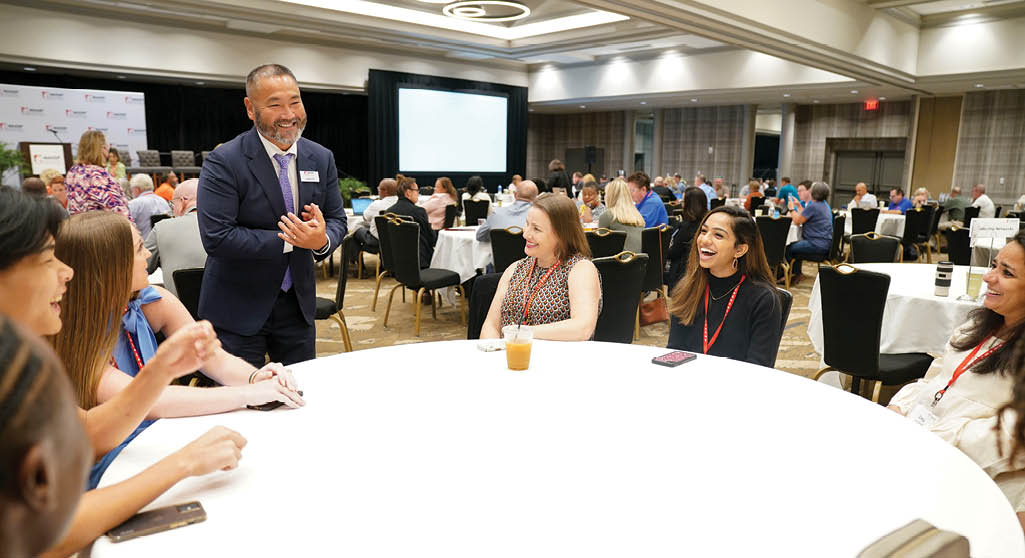Role Call: September 2023

Last year was my second as CEO of NASSP. I wanted to get to know our members in person, on their terms, and see their work in schools. I had a jam-packed travel schedule, visiting school leaders in 22 states. It was exhausting but also exhilarating. The minute I walked into the room with our members and with people from our state associations, my fatigue would suddenly disappear. It didn’t matter if it was a board meeting with 15 folks or whether it was a convening of 3,000 people. Each visit was amazing thanks to great conversations and meaningful, substantive discussions. And each visit reminded me of something important: the power of relationships.
Several of the articles in this issue of Principal Leadership focus on that power and how we as school leaders can harness it to support our school communities. As educators know all too well, relationships are a two-way street. In schools especially, they require tremendous effort, patience, and a shared commitment to the students and families we serve.
Get Involved
As we begin a new school year, I want to encourage you to deepen your relationship with NASSP, your professional association. We are here to support you as you strive to do what’s best for kids and families. For that support to be meaningful and substantive (like all those conversations I had!), you need to get involved with your state association and advocate for your school at the local level. You can also make your voice heard at the national level by attending NASSP events such as the Ignite conference, participating in Leadership Networks, signing up to be an NASSP Ambassador, and engaging in calls to action to promote mental health in schools and fix the educator shortage.
Why do we want to hear from you? Because you are the experts. Our job is to elevate and amplify your voice, because the most important things that you bring to any education conversation are your commitment to teaching and learning and your expertise around child development. With all the distractions we face in education—the culture wars waged by political extremists—principals must remain the voice of what’s right for kids and the adults who support them. Never forget that your job is to keep what’s in the best interest of children at the forefront.
I’m not just talking about principals. As the head of a school, a principal has the most visibility and name recognition in a school community. But assistant principals make the whole place work. If you’re an assistant principal reading this article (with a warm cup of coffee, I hope), please seize every opportunity you can to learn and grow. I encourage you to push yourself outside of your comfort zone and to let yourself be pushed outside of it as well. The people who have identified you as an emerging talent or a future principal see something in you that you probably don’t yet recognize in yourself. Trust what they see. Trust yourself.
Overcoming Differences
Although the worst of the pandemic is behind us, we’ll be dealing with its aftermath for years to come. We have students with interrupted learning, students who need additional help in literacy and numeracy, and students who need significant support with their mental health. And people are arguing about what books they’re going to ban.
At the end of the day, none of that noise matters. What matters most are the individual and collective relationships that you as a school leader can build with people. Those relationships can overcome differences. We might not philosophically agree, but if I have respect for you as a human being and you have respect for me, we can move the education of our kids forward, keeping our politics aside.
Parents will do anything if they understand that their principal and their kid’s teachers are trying to do the right thing. Parents must know that you really do have their backs and that you’re ultimately fighting for their child. But you’ve got to earn their trust by developing that relationship. This school year, let your care and concern really shine through in the way that you treat people.
Growing the Pipeline
As you serve your schools and communities, don’t forget to do all that you can to strengthen the educator pipeline. Teaching takes an incredible amount of work, practice, dedication, and professional learning. The importance of education—and educators—is paramount to our country’s future and success, and we need to start treating it that way.
Identify students who have potential and talent, a strong moral compass, and a desire to do right by others. Encourage them to follow in your footsteps and pursue careers in education. The opportunities to cultivate student leadership development abound in schools. Whether it’s through sports or performing arts; through clubs such as National Honor Society, National Junior Honor Society, or National Elementary Honor Society; or student government organizations such as National Student Council, student leaders in our schools are learning in real time how to become the next generation of leaders in our country.
So, talk to your students about what you do as an educator and why you do it and how maybe they could lead a school one day, too. After all, strengthening the pipeline comes down to building relationships with students and their families—and that starts with you.
Ronn K. Nozoe is the CEO of NASSP. Previously, he served as associate executive director and interim executive director of ASCD. A former deputy assistant secretary for policy and programs at the U.S. Department of Education, he also served as deputy state superintendent in his home state of Hawaii, where he began his career as a teacher, vice principal, and principal.
